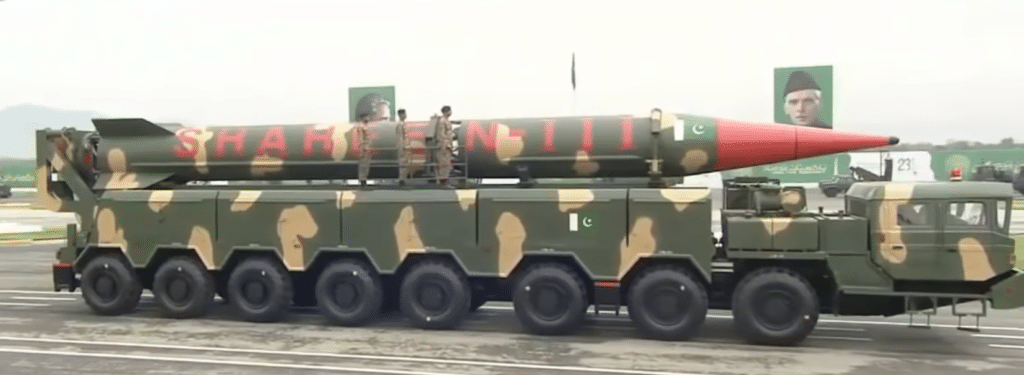Upsetting Pakistan’s ballistic missile ambitions, the United States has slapped sanctions on a Chinese firm for links with the missile program in a new non-proliferation drive.
On September 12, the United States State Department said in a release that it was imposing sanctions on a Chinese research organization and several Chinese firms that it claimed were providing supplies to Pakistan for their ballistic missile program.
The spokesperson of the US State Department, Matthew Miller, claimed in the statement that Pakistan’s National Development Complex (NDC) had collaborated with the Beijing Research Institute of Automation for Machine Building (RIAMB) Industry to acquire equipment for testing the rocket motors for the Shaheen-3 and Ababeel systems and possibly for larger systems.
Pakistan’s Shaheen-III is a two-stage, medium-range ballistic missile powered by solid fuel. Reports indicate that the missile has a 2,750-km range and can deliver both conventional and nuclear warheads, making it the longest-range missile in Pakistan’s strategic arsenal.
On the other hand, with a stated maximum range of 2,200 kilometers, the Ababeel is a medium-range ballistic missile consisting of three stages and solid fuel.
For willfully transferring equipment under missile technology limitations, the sanctions also targeted Pakistan-based Innovative Equipment, a Chinese person, and the Chinese companies Hubei Huachangda Intelligent Equipment Co., Universal Enterprise, and Xi’an Longde Technology Development Co.
“As today’s actions demonstrate, the United States will continue to act against proliferation and associated procurement activities of concern, wherever they occur,” Miller said in the official statement.
Liu Pengyu, spokesperson for the Chinese embassy in Washington, reacting to the latest round of sanctions, said China firmly opposes unilateral sanctions and long-arm jurisdiction that have no basis in international law or authorization of the UN Security Council. China will “firmly protect” Chinese companies’ and individuals’ rights and interests.
The new sanctions come just months after the US sanctioned three Chinese companies and one Belarus-based firm for their alleged links to Islamabad’s missile development program. At that time, the State Department said, “These entities have supplied missile‐applicable items to Pakistan’s ballistic missile program, including its long-range missile program.”
Pakistan and China have unequivocally criticized these sanctions. In April, for instance, the Pakistani Foreign Ministry responded, “Pakistan rejects political use of export controls.”

At the time, the spokesperson of Pakistan’s Foreign Office, Mumtaz Zahra Baloch, issued a statement: “We reject political use of export controls. It is well known that the same jurisdictions, which claim strict adherence to non-proliferation controls, have waived off licensing requirements for advanced military technologies for some countries.” She did not name a country, but it was viewed as a reference to Pakistan’s arch rival, India.
She also said that by “accentuating military asymmetries”, “such discriminatory approaches and double standards” undermine the legitimacy of non-proliferation regimes as well as the objectives aimed at achieving regional and global peace and security.
Although Pakistan has yet to comment on the issue, the US State Department explained the reasoning behind slapping sanctions: “These sanctions are being imposed because these entities and individuals knowingly transferred equipment and technology controlled under the Missile Technology Control Regime (MTCR) Annex, in support of MTCR Category I missile programs, to a non-MTCR country.”
While Pakistan opposes these sanctions tooth and nail, it has refused to join the Missile Technology Control Regime (MTCR), unlike India, which became a signatory to the export control regime aimed at non-proliferation in 2016.
Pakistan Is Not An MTCR Signatory
The goal of the 35-member Missile Technology Control Regime (MTCR) is to prevent the proliferation of missiles and missile technology through a multilateral export control regime or flexible political agreements.
While not a treaty, the MTCR aims to reduce the proliferation of weapons of mass destruction (WMD) by regulating the export of products and technologies that could be used to support weapons delivery systems.
Within this framework, the MTCR focuses specifically on unmanned aerial vehicles (UAVs) capable of transporting a payload of no less than 500 kilograms over a minimum distance of 300 kilometers, as well as on the hardware, software, and technology associated with these systems.
MTCR evaluates membership requests based on several factors, such as the potential new member’s ability to further international non-proliferation efforts, the extent of their sustained and sustainable commitment to non-proliferation, the effectiveness of their legally-based export control system in implementing the MTCR guidelines and procedures, and the efficient administration and enforcement of such controls.
Pakistan’s missile program is developing quickly, leading to improvements in range, accuracy, and payload capacity. Notably, foreign support (especially from its close ally China) has helped its ballistic and cruise missile development.
However, despite its strong interest in export control regimes, Pakistan has not yet shown interest in joining the West-dominated Missile Technology Control Regime (MTCR). While the nation has developed a variety of short—and medium-range ballistic missiles as well as unmanned aerial vehicles (UAVs), it has never applied to join the MTCR, which may have made it easier for it to obtain cutting-edge missile technologies.
Previous administrations contended that the various stakeholders within the Pakistani administration had been unable to reach a consensus over MTCR membership. That is why Pakistani’s missile programs continue to face roadblocks. However, Pakistan continues to give the impression that the MTCR grouping is biased against the country.
When the US State Department imposed sanctions in April, the Pakistani Foreign Office spokesperson Baloch said that “the same jurisdictions” that claim “strict adherence” to the nonproliferation of weapons and military technologies would occasionally make exceptions “for some countries” and have even waived licensing requirements to help them obtain cutting-edge military equipment.
- Contact the author at sakshi.tiwari9555 (at) gmail.com
- Follow EurAsian Times on Google News